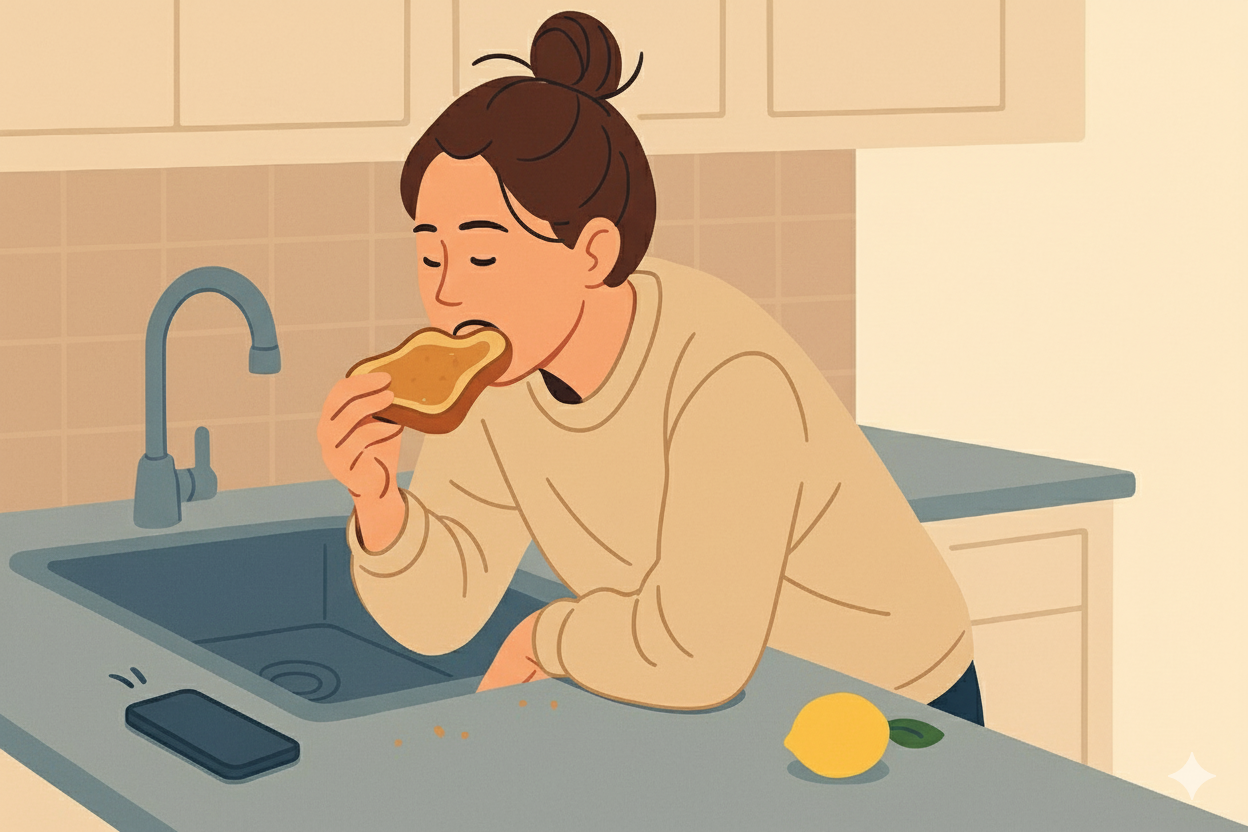The 7:23 AM Truth
It’s 7:23 on a Tuesday. You’re eating peanut butter toast over the sink, wearing yesterday’s sweatshirt, ignoring seventeen group chat notifications you don’t have the energy for.
Not Instagrammable. But it works.
This moment—feeding yourself, dodging obligations, giving zero thought to appearances—is real self-care. Not the rose-petal bath kind. The survival kind.
Sometimes the most revolutionary act of self-care is eating toast over the sink and calling it good enough.
The Glamour Trap: When Pretty Becomes Performance
The wellness industry keeps flogging “faux self-care”: £300 spa days, curated bath rituals, designer yoga mats. All stuff that looks great in a flatlay but adds more stress to your calendar and bank balance.
One guy put it perfectly: “I had a calendar for my self-care. I was literally scheduling spontaneity.” If that doesn’t scream broken system, I don’t know what does.
If you want to spot the difference between fake wellness and the real thing, Real Self-Care by Dr. Pooja Lakshmin cuts through the nonsense.
Why Boring Works Better
Neuroscience tells us the stuff that actually resets your brain is boring as hell. Routine, unstaged, maintenance acts.
Jennifer’s toast-over-sink breakfast works because:
- She nourished herself without fuss.
- She ignored draining social demands.
- She gave herself permission to be unpolished.
Dr. Emily Nagoski calls these “completing the stress cycle.” Not glamorous. Effective.
Sarah, a teacher, figured this out when she started counting “micro-moments” as care: water between classes, two minutes breathing in her car, eating lunch away from her desk. She didn’t go viral, but she stopped feeling like a zombie.
Want a playbook? Tiny Habits by BJ Fogg shows how ridiculously small actions compound into lasting change.
The Permission Experiment
Unglamorous care is about giving yourself permission to be cared for without performance.
Eat sitting down. Drink your coffee without scrolling. Take a shower without planning your day. These tiny, unshareable moments count more than the staged ones.
Rebecca cried the first time she ate lunch at a table instead of standing in the kitchen multitasking. Not because it was glamorous, but because it reminded her she deserved to be fed like a human, not refuelled like a machine.
The Maintenance Mindset
Self-care isn’t a spa day; it’s an oil change. You don’t wait until your car explodes to add oil. You top it up regularly, unglamorous as it is. Humans are the same.
Lisa ditched “Self-Care Sundays” for what she calls “maintenance moments.” Stretching while the kettle boiled. Listening to one favourite song on the commute. Texting a mate once a week. Nothing fancy, but more effective than a hundred scented candles.
Tools for Unglamorous Care
- Real Self-Care – how to spot marketing traps and build authentic care
- Tiny Habits – the science of micro-changes that actually stick.
- A water bottle – because hydration is more radical than jade rollers.
- A basic planner – track energy, not productivity.
- A cozy blanket – for unapologetic sofa time.
Final Squeeze
The toast-over-sink philosophy isn’t about lowering standards. It’s about raising awareness of what’s already possible in your messy, ordinary life.
Forget the curated bath bombs. Count the boring stuff. Because that’s the care you’ll actually keep doing — and the care that actually works.
Join The Extra Squeeze — weekly scenarios, science bites, and tiny actions to help you squeeze more from your day.
Enjoyed this article?
Get your Free Starter Pack – A library of templates, worksheets and evidence‑based strategies to design your life. Download it here.
Join Extra Squeeze – My weekly newsletter packed with growth‑by‑design insights delivered straight to your inbox. Sign up now.
Related reads: Escaping the Scroll and The Sunday Scaries.

